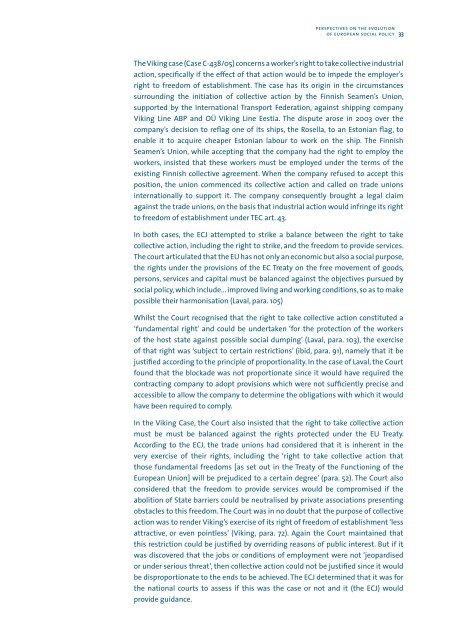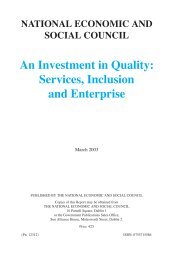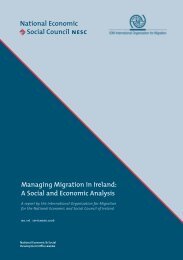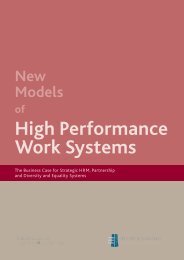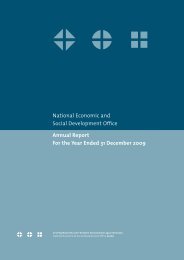4. Perspectives on the Evolution of European Social Policy
4. Perspectives on the Evolution of European Social Policy
4. Perspectives on the Evolution of European Social Policy
- No tags were found...
Create successful ePaper yourself
Turn your PDF publications into a flip-book with our unique Google optimized e-Paper software.
perspectives <strong>on</strong> <strong>the</strong> evoluti<strong>on</strong><strong>of</strong> european social policy 33The Viking case (Case C-438/05) c<strong>on</strong>cerns a worker’s right to take collective industrialacti<strong>on</strong>, specifically if <strong>the</strong> effect <strong>of</strong> that acti<strong>on</strong> would be to impede <strong>the</strong> employer’sright to freedom <strong>of</strong> establishment. The case has its origin in <strong>the</strong> circumstancessurrounding <strong>the</strong> initiati<strong>on</strong> <strong>of</strong> collective acti<strong>on</strong> by <strong>the</strong> Finnish Seamen’s Uni<strong>on</strong>,supported by <strong>the</strong> Internati<strong>on</strong>al Transport Federati<strong>on</strong>, against shipping companyViking Line ABP and OÜ Viking Line Eestia. The dispute arose in 2003 over <strong>the</strong>company’s decisi<strong>on</strong> to reflag <strong>on</strong>e <strong>of</strong> its ships, <strong>the</strong> Rosella, to an Est<strong>on</strong>ian flag, toenable it to acquire cheaper Est<strong>on</strong>ian labour to work <strong>on</strong> <strong>the</strong> ship. The FinnishSeamen’s Uni<strong>on</strong>, while accepting that <strong>the</strong> company had <strong>the</strong> right to employ <strong>the</strong>workers, insisted that <strong>the</strong>se workers must be employed under <strong>the</strong> terms <strong>of</strong> <strong>the</strong>existing Finnish collective agreement. When <strong>the</strong> company refused to accept thispositi<strong>on</strong>, <strong>the</strong> uni<strong>on</strong> commenced its collective acti<strong>on</strong> and called <strong>on</strong> trade uni<strong>on</strong>sinternati<strong>on</strong>ally to support it. The company c<strong>on</strong>sequently brought a legal claimagainst <strong>the</strong> trade uni<strong>on</strong>s, <strong>on</strong> <strong>the</strong> basis that industrial acti<strong>on</strong> would infringe its rightto freedom <strong>of</strong> establishment under TEC art. 43.In both cases, <strong>the</strong> ECJ attempted to strike a balance between <strong>the</strong> right to takecollective acti<strong>on</strong>, including <strong>the</strong> right to strike, and <strong>the</strong> freedom to provide services.The court articulated that <strong>the</strong> EU has not <strong>on</strong>ly an ec<strong>on</strong>omic but also a social purpose,<strong>the</strong> rights under <strong>the</strong> provisi<strong>on</strong>s <strong>of</strong> <strong>the</strong> EC Treaty <strong>on</strong> <strong>the</strong> free movement <strong>of</strong> goods,pers<strong>on</strong>s, services and capital must be balanced against <strong>the</strong> objectives pursued bysocial policy, which include... improved living and working c<strong>on</strong>diti<strong>on</strong>s, so as to makepossible <strong>the</strong>ir harm<strong>on</strong>isati<strong>on</strong> (Laval, para. 105)Whilst <strong>the</strong> Court recognised that <strong>the</strong> right to take collective acti<strong>on</strong> c<strong>on</strong>stituted a‘fundamental right’ and could be undertaken ‘for <strong>the</strong> protecti<strong>on</strong> <strong>of</strong> <strong>the</strong> workers<strong>of</strong> <strong>the</strong> host state against possible social dumping’ (Laval, para. 103), <strong>the</strong> exercise<strong>of</strong> that right was ‘subject to certain restricti<strong>on</strong>s’ (ibid, para. 91), namely that it bejustified according to <strong>the</strong> principle <strong>of</strong> proporti<strong>on</strong>ality. In <strong>the</strong> case <strong>of</strong> Laval, <strong>the</strong> Courtfound that <strong>the</strong> blockade was not proporti<strong>on</strong>ate since it would have required <strong>the</strong>c<strong>on</strong>tracting company to adopt provisi<strong>on</strong>s which were not sufficiently precise andaccessible to allow <strong>the</strong> company to determine <strong>the</strong> obligati<strong>on</strong>s with which it wouldhave been required to comply.In <strong>the</strong> Viking Case, <strong>the</strong> Court also insisted that <strong>the</strong> right to take collective acti<strong>on</strong>must be must be balanced against <strong>the</strong> rights protected under <strong>the</strong> EU Treaty.According to <strong>the</strong> ECJ, <strong>the</strong> trade uni<strong>on</strong>s had c<strong>on</strong>sidered that it is inherent in <strong>the</strong>very exercise <strong>of</strong> <strong>the</strong>ir rights, including <strong>the</strong> ‘right to take collective acti<strong>on</strong> thatthose fundamental freedoms [as set out in <strong>the</strong> Treaty <strong>of</strong> <strong>the</strong> Functi<strong>on</strong>ing <strong>of</strong> <strong>the</strong><strong>European</strong> Uni<strong>on</strong>] will be prejudiced to a certain degree’ (para. 52). The Court alsoc<strong>on</strong>sidered that <strong>the</strong> freedom to provide services would be compromised if <strong>the</strong>aboliti<strong>on</strong> <strong>of</strong> State barriers could be neutralised by private associati<strong>on</strong>s presentingobstacles to this freedom. The Court was in no doubt that <strong>the</strong> purpose <strong>of</strong> collectiveacti<strong>on</strong> was to render Viking’s exercise <strong>of</strong> its right <strong>of</strong> freedom <strong>of</strong> establishment ‘lessattractive, or even pointless’ (Viking, para. 72). Again <strong>the</strong> Court maintained thatthis restricti<strong>on</strong> could be justified by overriding reas<strong>on</strong>s <strong>of</strong> public interest. But if itwas discovered that <strong>the</strong> jobs or c<strong>on</strong>diti<strong>on</strong>s <strong>of</strong> employment were not ‘jeopardisedor under serious threat’, <strong>the</strong>n collective acti<strong>on</strong> could not be justified since it wouldbe disproporti<strong>on</strong>ate to <strong>the</strong> ends to be achieved. The ECJ determined that it was for<strong>the</strong> nati<strong>on</strong>al courts to assess if this was <strong>the</strong> case or not and it (<strong>the</strong> ECJ) wouldprovide guidance.


